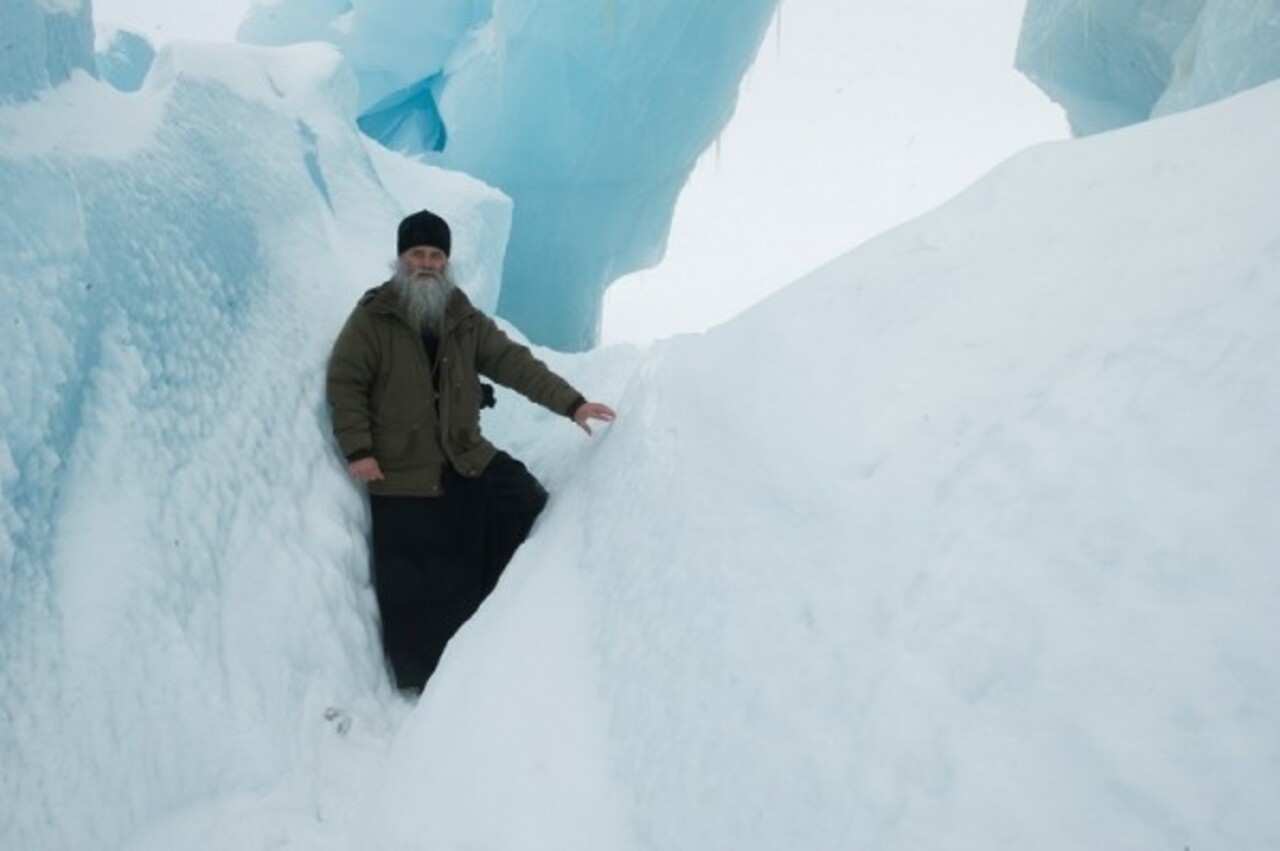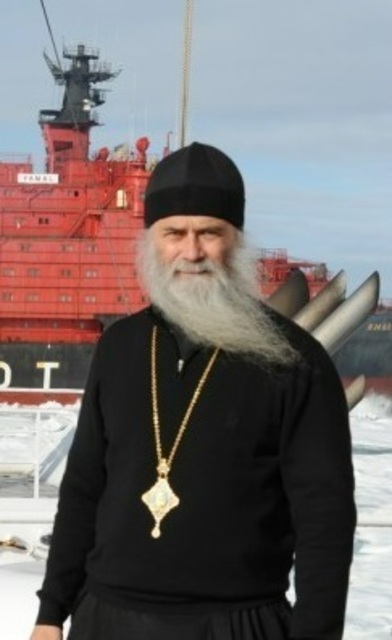
The following is a translation from French. To read the French version of this report, visit Heidi.News.
We are still at the Kempinsky Hotel in St. Petersburg. Bishop Yakov, who “crossed the fire”, and me, trying to convince him to let me accompany him to his hostile lands (in every sense of the word).
Yakov says that he spent 20 years in the Trinity monastery of St. Sergius, east of Moscow, before he was appointed archimandrite by His Holiness Patriarch Kirill.
“Do you know that the Bolsheviks had turned that monastery, the heart of Russian Orthodox spirituality, into a training center for radio operators? They wanted to strike pitilessly at our people's spiritual heart.” Then he tells me about Pavel Florensky, the theologian, priest, philosopher, and, above all, great Mathematician — Russia's Leonardo da Vinci — who was executed by the Bolsheviks in Leningrad in 1937.
“I wrote about it here. It was meant to be my speech yesterday before the President, but then we decided on something else. For those who spend their lives studying the Arctic to find ways to develop this region, the richest on the face of the earth and which God gave to Russia, I wanted to quote the wise words of Florensky, ‘From science comes true faith.’ The time has come for science, true science to become faith because Russia's destiny is in faith, and the Russian Arctic speaks to this, our spiritual mission in the world.”

As a nonprofit journalism organization, we depend on your support to fund more than 170 reporting projects every year on critical global and local issues. Donate any amount today to become a Pulitzer Center Champion and receive exclusive benefits!
Though I'm taking notes, I lose the logical thread. I am well aware of the Russian mysticism about the Great North that goes back to Peter the Great, I know penchant for the extreme, the cult of the hero challenging the unknown and nature in the name of the fatherland, whether it's czarist, socialist or Putinist. I know what the Arctic means for Putin's Russia, that it's the ATM and life insurance of his regime, a formidable geopolitical asset, a vault for its energy and mineral resources that are becoming more accessible because of climate change. I know this is the region where the Kremlin is focusing almost all of its economic investments and its nuclear power. But what does God have to do with oil, gas, gold or nickel?
I am confused by this crusader monk who came from the Arctic ice and seems stuck in a remote, anti-modern mindset, full of dark resentment. I suddenly see him as the icon that the press officer Olga mentioned but of a menacing sort. I start to sense the existence of an ideology or theology of the Arctic as the Great Russia Holy Land envisioned by the new czar.
Vladika speaks slowly in a low voice, speeding up with anger: “The time has come for a deep, primordial, radical reconstruction. The history of Russia and that of the Arctic are imbued in the pathos of faith. The pioneers ventured out not knowing where they would find new land, what they would encounter, if they would ever go home. They were guided by faith. And I still see Russians in the Arctic like that, real people, like my friend Ruksha, who governs the Northern Sea Route, because otherwise there would only be outsiders here. Not only is life hard up there, but because the Arctic is the culmination of life itself and conquest. You have to be strong spiritually, mentally, morally, physically and politically. The true Russia is in the Arctic because in the north there is the divine and, in the south, human nature.”
Vladika again flashes his chilling polite-merciless smile, his white teeth showing between the thick hair of his beard. “When the State collapsed in the 1990s, the north was left to its own devices, and the powers of foreign capital took advantage. Ideological sabotage came like a bomb through Protestant clergy paid for by the Americans and Norwegians.”
There is no evidence for this assertion, but Vladika goes on undeterred. “And the Nenets, like all the indigenous people of the north, are naïve, used to life in the tundra, and they can't tell Good from Evil. These Protestant sects are a threat, agents of Satan the tempter, of the West that says everything is possible."
He looks at me straight on: "For you Catholics, the end justifies the means, for Orthodox Russia, only with the truth can you fight evil and win hearts. Now we see how minds are infected with anti-Russian ideas. And how truth no longer matters. In his third book, the prophet Ezra says there will come a time when one part of the world will ask another: ‘But you have not seen the truth? Has it escaped you?’ That is what is happening in Ukraine. The truth has been lost sight of. But everything is returning to normal. The Russian Orthodox Church sanctifies the return of Russia, starting from the Great North. Only Russia has chosen the north as a supreme blessing, as a dominant part of its being. Do you know the words of Mikhail Vasilyevich Lomonosov? ‘Russia will grow in Siberia and in the ice and it will impose its order.’ This is the exceptional thing about our civilization. We draw our strength and destiny from it.”
Vladika accepts a cup of tea. I tell him that I wish I could spend a few days with him in Naryan-Mar and tell his story from where he lives, and perhaps visit the church of St. Nicholas on the Charles Alexander Island. This was the last one he consecrated as he told me, “because it is the land closest to the North Pole, it is Russian, and it is blessed by God.”
“But Vladika, how could it be done? You know that it is impossible for a Western journalist to enter these regions without an invitation and the right clearance from the FSB, the Russian security services. It would be wonderful if you could send me a letter from the diocese, and maybe get permission from the local security services”. He answers that it is fine with him but, later, because he has long trips planned, to the Sakhalin Islands, the Curili Islands, and then to Antarctica because Kirill has also appointed him bishop of the South Pole.
“I consecrated the church at our research station in Bellingshausen in 2014. I celebrated with the Patriarch in 2016, who came straight from Cuba where he had met the Pope”. After almost a thousand years of silence, the meeting of the two church leaders had been an ecumenical glimmer of hope, but one soon extinguished. “But my patriarchal mission is the Arctic,” he says. He is already standing when he tells me about the “Project Russia Arctic,” that Patriarch Kirill had started in 2016. Both were on a mission to the Solovki Islands, in the White Sea, also called Hell Islands because they are the site of the Soviet lagers — where about one million died — the gulag system was created in a 16th-century monastic complex, the epitome of Orthodox asceticism.
“It is a patriarchal project of rebirth, returning to our mission in the north. According to President Vladimir Vladimirovich Putin, the spiritual and state processes must work side by side, especially for the development of the Northern Sea Route. It is the only natural passage between the two worlds that have shaped the fate of mankind, Europe and the East, and this is why people have always sought it. This is a blessed maritime passage, unlike those of Suez and Panama, which were dug into the rock, confirming the prophecy of the book of Job: ‘He putteth forth his hand upon the rock; he overturneth the mountains by the roots; he cutteth out rivers among the rocks.'“
The last I see of the archimandrite is a flutter of black as he nimbly climbs into the back seat of a blue Mercedes, in front of the hotel, along the Moika. The Hermitage is flooded by the April sun in the background.
Translated by Miriam Hurley.
- View this story on Reportagen
- View this story on L'Internazionale







